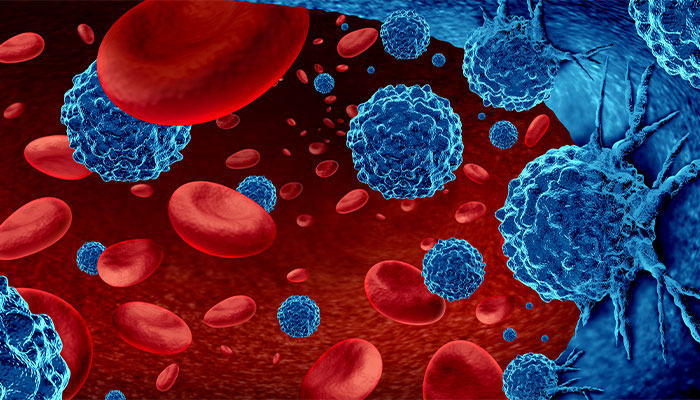HOW CAN WE HELP YOU? Call 1-800-TRY-CHOP
In This Section
Can CAR T Cells Effectively Treat Blood Cancers With Downregulated CD20 Antigens?

CHOP and Penn researchers have gained insight into how some patients develop resistance to CD20-targeted immunotherapies for certain blood cancers.
The findings:
Researchers at Children's Hospital of Philadelphia, the University of Pennsylvania, and the Wistar Institute found that gene splicing strongly affects the C20 antigen, an immunotherapy target in blood cancers and hematologic disorders. When dysregulated, it can cause significant reductions in CD20 protein levels expressed on the surfaces of cells. For example, the downregulation of CD20 results in patients developing resistance to immunotherapies targeting this antigen, leading to treatment failures.
The researchers demonstrated that the MS4A1 gene encoding human CD20 produces several messenger RNA (mRNA) isoforms that differed in the efficiency with which the protein is made. The researchers identified four variants in total among normal and malignant cells. Of the four variants, V1 and V3 were by far the most abundant, yet only V3 is efficiently translated into CD20. In contrast, variant V1 has trouble recruiting ribosomes responsible for making proteins, making it difficult for monoclonal antibodies to target affected cells.
The study team also demonstrated that patients with low levels of CD20 may still respond to chimeric antigen receptor T (CAR T) cell therapy, an outcome that was previously not considered possible. The study showed that CAR T-cells were more effective in targeting V1-expressing cells compared with the bispecific antibody mosunetuzumab, which was only effective against V3-expressing cells.
Why it matters:
CD20 is expressed exclusively on the surface of normal and malignant B cells and is not expressed by other cell types in the body. Immunotherapies targeting the CD20 antigen have transformed treatment for patients with a variety of B-cell lymphomas; however, not all patients respond to this therapy and some become resistant due to a loss of the CD20 antigen.
The CHOP, Penn, and Wistar researchers' findings advance understanding of CD20 expression by demonstrating that mutations are not the sole drivers of relapse. With the knowledge that alternative splicing may explain why some patients develop resistance to therapy, clinicians may consider alternate methods to CD20-targeted therapy.
"If a patient has relapsed because CD20 levels are downregulated because of splicing defects, CAR T-cell therapy may still be an option, as it requires a lower threshold of the protein in order to be effective," said first study author Zhiwei Ang, PhD. "These findings may help clinical staff offer more precise options when treating these hematologic malignancies."
Who conducted the study:
Dr. Ang is a research associate scientist in the lab of senior author Andrei Thomas-Tikhonenko, PhD, chief of the Division of Cancer Pathobiology and Mildred L. Roeckle Endowed Chair at CHOP, and professor of Pathology at the University of Pennsylvania. On the immunotherapy aspects of this study, they worked with Penn colleagues Stephen Schuster, MD, director of Lymphoma Translational Research, and Marco Ruella, MD, assistant professor of Hematology-Oncology.
How they did it:
Through a collaboration with the lab of Paul Lieberman, PhD, at the Wistar Institute, it became clear that redirection of splicing from V1 to V3 during B-cell activation and Epstein-Barr virus infection coincided with increased CD20 positivity. Accordingly, in diffuse large B-cell lymphoma, a cancer of activated B-cells, only V3 correlated with CD20 protein levels. To prove causation, the scientists transiently enhanced CD20 expression and observed anti-CD20 antibody rituximab-mediated cytotoxicity in a panel of B-cell lines. In addition, reconstitution of CD20-knockout cells with V3 mRNA led to the recovery of CD20 positivity; but in V1-reconstituted cells, CD20 protein levels were undetectable.
To determine whether CD20 splicing is involved in immunotherapy resistance, the researchers performed RNA sequencing on four follicular lymphoma relapses following treatment with mosunetuzumab, a bispecific antibody binding simultaneously to CD20 and CD3 on the surface of killer T cells. They discovered that in two of them, the downregulation of CD20 was accompanied by a V3-to-V1 shift. This led them to conclude that splicing-mediated mechanisms of epitope loss extend to CD20-directed immunotherapies.
Quick thoughts:
"Following treatment with a CD20-directed antibody immunotherapy, a patient's CD20 levels often become barely detectable," Dr. Thomas-Tikhonenko said. "We previously thought that mutations in the CD20 gene are always to blame. If that was indeed the case, there would be no easy way to reverse them, and you would need to identify a different target. Now we have demonstrated that in some cancers CD20 downregulation occurs through alternative splicing, and CD20-directed CAR T cells may provide an alternative for these patients."
What's next:
The investigators anticipate their findings will inform future research by other scientists and further exploration of how CAR T cells act on low levels of CD20 on cells' surface. Additionally, the researchers foresee collaborative work with colleagues in the field of RNA biochemistry to address the challenge the field has yet to solve — how to modulate mRNA splicing in vivo and how to deliver these therapeutics to tumor cells.
Where the study was published:
The study appeared in Blood, accompanied by an Editorial.
Learn more:
Read more about the study in this CHOP press release.



